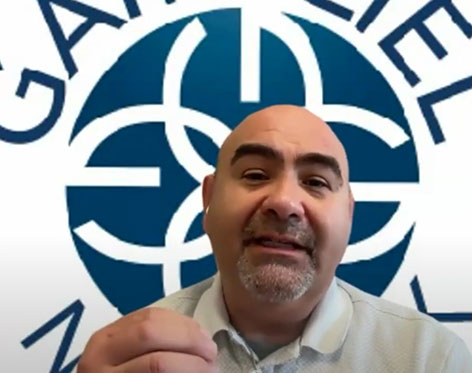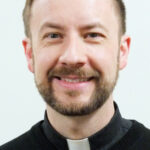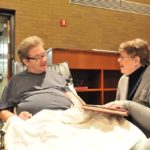
Juan Soto speaks during a virtual Lunch and Learn presentation earlier this month.
By Lindsay Steele
The Catholic Messenger
The U.S. has been marked by migration throughout its history, presenter Juan Soto said during a diocesan Social Action Lunch and Learn earlier this month. However, the factors leading people to leave their homes have exacerbated in recent years, particularly south of the border, in Ukraine and in the Middle East.
“Today, we face the largest movement of displaced people and refugees in recent history,” Soto told participants during his virtual presentation, “Achieving Justice Through Systemic Change: Navigating Faith and Politics.”
Soto, treasurer of the National Catholic Council for Hispanic Ministry (NCCHM), immigrated to the United States from Mexico as a child and now lives in the Chicago metro area. He is also the organizing director of Gamaliel Network, with more than 30 years of experience training community and faith leaders in building political power and creating organizations that unite people of diverse faiths and races. Soto admits there is a “great lack of trust” in organizations that accompany refugees and migrants but “every encounter is a unique opportunity for an encounter with Jesus.”
Immigration is a complex phenomenon that affects a multiplicity of economic, political, social and security issues around the world, he said. Often, immigrants are viewed with “a negative perception that prevents us from welcoming them. We are not treating them as children of God. This happens inside and outside the Church. They’re seen as a threat, and the fear of others leads to attitudes of exclusion.” While countries have the right to protect their borders, “We must proclaim the dignity of every migrant, every displaced person and every refugee.”
Parishes can promote the active participation of immigrants by including them in councils and other pastoral responsibilities. Recognize the valuable contributions immigrants offer to parishes and communities, Soto said. Spanish and English-speaking parishioners often have separate ministries. Soto encourages integration and appreciation between cultures.
Through Gamaliel and NCCHM, Soto helps young immigrants to lift their voices in the political arena. The percentage of young adult Hispanics in the U.S. is rising dramatically but voter turnout for this group is low. “The Latino vote has the power to influence elections in every state,” Soto said. In 2020, NCHM and Gamaliel helped launch a voter registration campaign. Because the Church does not endorse a single political party, Soto encourages would-be voters to read the U.S. Conference of Catholic Bishops’ document, “Forming Consciences for Faithful Citizenship.”
At the end of the presentation, Soto answered questions from webinar participants. Loxi Hopkins, a diocesan Social Action volunteer, expressed frustration with both major political parties whom she believes are using immigrants as political pawns. “How do we push both parties” to be better, she asked. “Too many times it’s a ‘Bears versus Vikings’ kind of attitude. … Too many times we don’t listen to the other,” Soto replied. “We need to build relationships that go deeper than a political party or even a bipartisan attitude.”
He encourages Catholics to lead the way in building a culture that respects and finds value in diverse cultural and religious identities. People with positive perceptions of refugees can work to change the “migration narrative” of distrust and exclusion. “We are called as a Church to develop in solidarity and synodality the mission of listening, walking with and accompanying displaced people.”
Watch a video of the Lunch and Learn presentation at https://youtu.be/jUBjxJt3QvU.











